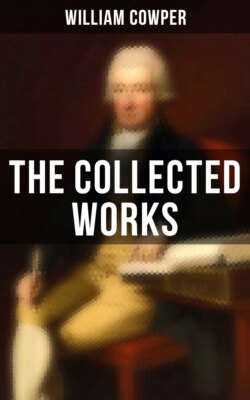Читать книгу The Collected Works - William Cowper - Страница 157
На сайте Литреса книга снята с продажи.
TO THE REV. JOHN NEWTON.[108]
ОглавлениеTable of Contents
Olney, Nov. 7, 1781.
My dear Friend—Having discontinued the practice of verse-making for some weeks, I now feel quite incapable of resuming it; and can only wonder at it as one of the most extraordinary incidents in my life that I should have composed a volume. Had it been suggested to me as a practicable thing in better days, though I should have been glad to have found it so, many hindrances would have conspired to withhold me from such an enterprise. I should not have dared, at that time of day, to have committed my name to the public, and my reputation to the hazard of their opinion. But it is otherwise with me now. I am more indifferent about what may touch me in that point than ever I was in my life. The stake that would then have seemed important now seems trivial; and it is of little consequence to me, who no longer feel myself possessed of what I accounted infinitely more valuable, whether the world's verdict shall pronounce me a poet, or an empty pretender to the title. This happy coldness towards a matter so generally interesting to all rhymers left me quite at liberty for the undertaking, unfettered by fear, and under no restraints of that diffidence which is my natural temper, and which would either have made it impossible for me to commence an author by name, or would have insured my miscarriage if I had. In my last despatches to Johnson I sent him a new edition of the title-page, having discarded the Latin paradox which stood at the head of the former, and added a French motto to that from Virgil. It is taken from a volume of the excellent Caraccioli,[109] called Jouissance de soi-meme, and strikes me as peculiarly apposite to my purpose.
Mr. Bull is an honest man. We have seen him twice since he received your orders to march hither, and faithfully told us it was in consequence of those orders that he came. He dined with us yesterday; we were all in pretty good spirits, and the day passed very agreeably. It is not long since he called on Mr. Scott. Mr. R—— came in. Mr. Bull began, addressing himself to the former, "My friend, you are in trouble; you are unhappy; I read it in your countenance." Mr. Scott replied, he had been so, but he was better. "Come then," says Mr. Bull, "I will expound to you the cause of all your anxiety. You are too common; you make yourself cheap. Visit your people less, and converse more with your own heart. How often do you speak to them in the week?" Thrice.—"Ay, there it is. Your sermons are an old ballad; your prayers are an old ballad; and you are an old ballad too."—I would wish to tread in the steps of Mr. Newton.—"You do well to follow his steps in all other instances, but in this instance you are wrong, and so was he. Mr. Newton trod a path which no man but himself could have used so long as he did, and he wore it out long before he went from Olney. Too much familiarity and condescension cost him the estimation of his people. He thought he should insure their love, to which he had the best possible title, and by those very means he lost it. Be wise, my friend; take warning; make yourself scarce, if you wish that persons of little understanding should know how to prize you."
When he related to us this harangue, so nicely adjusted to the case of the third person present, it did us both good, and, as Jacques says,
"It made my lungs to crow like chanticleer."
Our love of you both, though often sent to London, is still with us. If it is not an inexhaustible well, (there is but one love that can with propriety be called so,) it is, however, a very deep one, and not likely to fail while we are living.
Yours, my dear Sir,
W. C.
